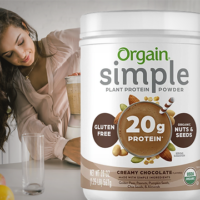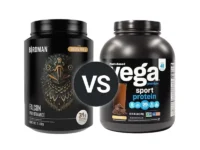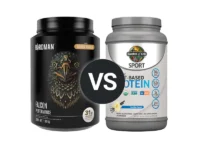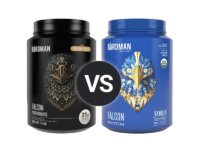Knowledge BaseYou're Questions Answered
How many calories are in pea protein powder?
Pea protein powder is a popular plant-based protein supplement derived from yellow split peas. It is valued for its high protein content and being a hypoallergenic option, making it suitable for various dietary needs. In addition to its protein content, understanding the calorie content of pea protein powder is important for those tracking their caloric intake or managing their diet.
Calorie Content in Pea Protein Powder
The calorie content of pea protein powder can vary depending on the specific product and formulation. On average, a typical 30-gram serving (about 1 scoop) of pea protein powder contains approximately 100 to 120 calories. This range is influenced by factors such as the processing method, the presence of added ingredients, and the protein concentration of the product1.
Breakdown of Nutritional Content
- Protein: A 30-gram serving typically provides around 20 to 25 grams of protein, contributing significantly to the total calorie count.
- Carbohydrates: Pea protein powder generally contains a small amount of carbohydrates, usually around 1 to 5 grams per serving, depending on the degree of processing and the presence of natural sugars or added sweeteners.
- Fats: The fat content in pea protein powder is usually minimal, often less than 2 grams per serving. This low fat content contributes to the relatively low-calorie count of the product.
Benefits of Pea Protein Powder
Pea protein powder is not only a low-calorie protein source but also offers several nutritional benefits:
- Almost Complete Amino Acid Profile: Although pea protein is often considered to have a slightly lower concentration of some essential amino acids compared to animal proteins, it still provides a broad spectrum of amino acids necessary for muscle growth and overall health.
- Digestibility: Pea protein is easily digestible and has a high digestibility score, meaning that the body can effectively absorb and use the protein it provides2.
- Hypoallergenic: Being free from common allergens like dairy, soy, and gluten, pea protein is an excellent choice for those with food sensitivities or allergies.
Usage and Considerations
Pea protein powder can be incorporated into the diet in various ways, including in smoothies, shakes, baking, and cooking. It is particularly useful for those looking to increase their protein intake without significantly increasing their calorie intake. When choosing a pea protein powder, it's important to consider the product's ingredients and whether it contains any added sugars or flavors that may affect the calorie count.
- Riaz, M. N., & Chaudry, M. M. (2004). Halal Food Production. CRC Press.
- Wolfe, R. R. (2015). Update on amino acid requirements: The challenge of determining the amino acid requirements for human adults. The Journal of Nutrition, 145(8), 2030S-2038S.
Related Questions

Your Answer
We are a participant in the Amazon Services LLC Associates Program, an affiliate advertising program designed to provide a means for us to earn fees by linking to Amazon.com and affiliated sites.





